Kalpana Blu-ray Movie
HomeKalpana Blu-ray Movie 
Blu-ray + DVDCriterion | 1948 | 152 min | Not rated | No Release Date
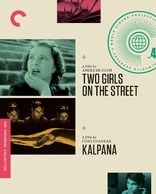
Price
Movie rating
6.7 | / 10 |
Blu-ray rating
| Users | 0.0 | |
| Reviewer | 3.5 | |
| Overall | 3.5 |
Overview
Kalpana (1948)
An ambitious dancer is determined to open a cultural center devoted to breathing new life into India's traditional artistic forms; meanwhile, the obvious adoration between him and his lead dancer arouses the jealousy of his enterprising companion.
Director: Uday Shankar| Foreign | Uncertain |
| Drama | Uncertain |
| Musical | Uncertain |
Specifications
Video
Video codec: MPEG-4 AVC
Video resolution: 1080p
Aspect ratio: 1.37:1
Original aspect ratio: 1.37:1
Audio
Hindi: LPCM Mono
Subtitles
English
Discs
Blu-ray Disc
Two-disc set (1 BD, 1 DVD)
DVD copy
Playback
Region A (locked)
Review
Rating summary
| Movie | 4.5 | |
| Video | 2.5 | |
| Audio | 3.0 | |
| Extras | 2.0 | |
| Overall | 3.5 |
Kalpana Blu-ray Movie Review
Reviewed by Jeffrey Kauffman February 17, 2023 Note: This film is available on Blu-ray as part of the Criterion release of Martin Scorsese's World Cinema Project, No. 4.
Criterion is often described as the very paradigm of a "niche" collector label, and in that regard, there may be nothing Criterion has offered over the
years that is more "niche" than their series of World Cinema Project offerings, all bearing the rather notable imprimatur of one
Martin Scorsese. This fourth volume follows in the footsteps of the previous three collections and offers another often bracing aggregation of little
or at least
lesser known films, some from rather unusual places and also at times addressing subjects that are not regular fodder for big budget Hollywood
extravaganzas.
Reviews of the previous three volumes in this series, all of which offer some really interesting and worthwhile films, are accessible by clicking on the
following links:
Martin Scorsese's World
Cinema Project, No. 1 Blu-ray review
Martin Scorsese's World
Cinema Project, No. 2 Blu-ray review
Martin Scorsese's World
Cinema Project, No. 3 Blu-ray review
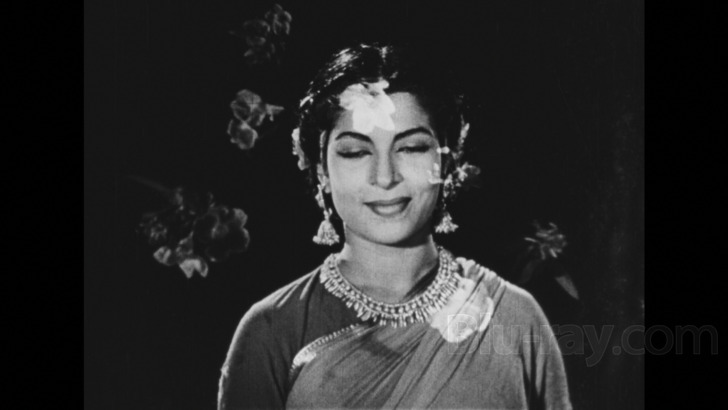
The great Broadway and very occasional film (The Pajama Game) star John Raitt once joked about getting to the age where he was better known for being Bonnie Raitt's father than for any of his considerable accomplishments. In that same vein, Ravi Shankar may have been bemused to see him become described as Norah Jones' father, though those with a perhaps more detailed knowledge of Indian "royalty" might have also mentioned that Norah was the niece of Ravi's older brother Uday, who himself was a legendary dancer and choreographer. Kalpana is the only film Uday Shankar made, and it is a visionary work that is unbelievably prescient, at least in some formative ways, for what would ultimately become described as "Bollywood".
There's a kind of unabashed "meta" quality to Kalpana, with Shankar appearing maybe more or less as himself, or at least an exaggerated version thereof, who is out to reinvent tradition in Indian dance. If that seems to provide at least the semblance of an underpinning for a plot, it's probably not hyperbole to describe Kalpana as less of a traditional narrative than a kind of "ultimate trip" experience that combines "swirling surrealist dance spectacles" (in the verbiage on the back cover of this release) with some interesting if perhaps tangential sociopolitical and socioeconomic subtext. This is a visual phantasmagoria that proves rather effortlessly how incredibly awesome the Shankar gene pool seems to be.
Kalpana Blu-ray Movie, Video Quality 
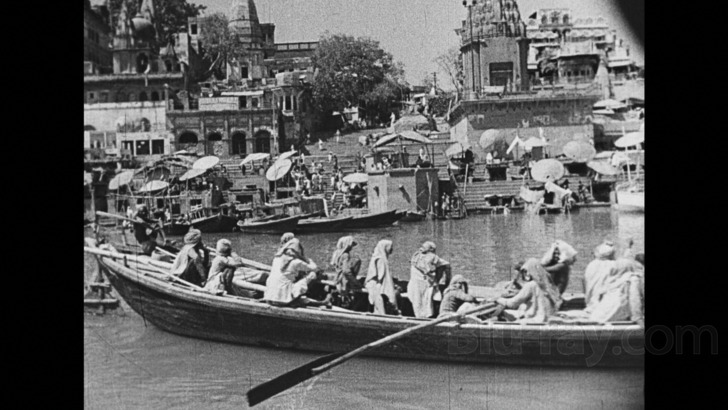
Kalpana is presented on Blu-ray courtesy of The Criterion Collection with an AVC encoded 1080p transfer in 1.37:1. Some introductory text before the main feature provides the following information on the restoration:
The Film Foundation's World Cinema Project was established by Martin Scorsese in 2007 to help foster cooperation among filmmakers worldwide and to identify, preserve, and restore endangered films representing diverse cultural heritage.Even more detailed information is imparted in Criterion's insert booket:
This film was restored in 2012 by The Film Foundation's World Cinema Project at Cineteca di Bologna / L'Immagine Ritrovata laboratory from original film elements preserved at the National Film Archive of India.
Kalpana is presented in its original aspect ratio of 1.37:1. This digital transfer was created in 2K resolution on an Arriscan film scanner from a 35 mm duplicate negative and a 35 mm print held at the National Film Archive of India in Pune. The original monaural soundtrack was restored from a 35 mm optical soundtrack negative.This is unfortunately the least pleasing looking transfer in this fourth volume of World Cinema Project offerings, and even a cursory glance at the screenshots I've uploaded to accompany this review will show that the elements utilized for this transfer have pretty substantial and recurrent damage. There is near constant scratching on display, sometimes so severe that the image is momentarily obscured, and there are a number of other unignorable signs of age related wear and tear, including quite a few nicks and other blemishes. Those issues combine with Shankar's repeated use of opticals for some frankly astounding visual effects, resulting in wide variances in clarity and general detail levels, as well at times with grain structure. The film is absolutely amazing by any standard, but the damage here is so prevalent my hunch is it might take a small fortune to digitally clean things up more significantly.
The film was restored in 2012 by the Cineteca di Bologna / L'Immagine Ritrovata, in association with The Film Foundation's World Cinema Project, the family of Uday Shankar, the National Film Archive of India, and Dungarpur Films. The restoration was funded by Doha Film Institute.
Kalpana Blu-ray Movie, Audio Quality 
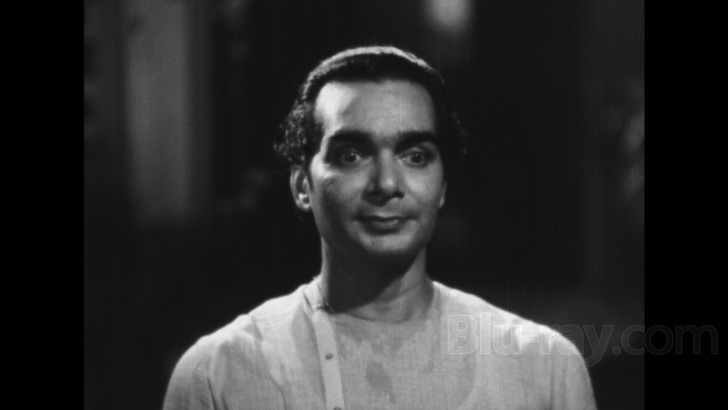
Kalpana features an LPCM Mono track in the original Hindi. There's noticeable hiss throughout the track as well as discernable distortion in some of the music cues in particular. The film's score is really remarkable, featuring what almost sounds like a Gamelan orchestra with punctuated vocalisms that together presage elements of Bollywood, as other aspects of the film do. While hiss and a bit of background crackle are probably only more noticeable in non-musical moments, dialogue still manages to be delivered cleanly and clearly. Optional English subtitles are available.
Kalpana Blu-ray Movie, Special Features and Extras 
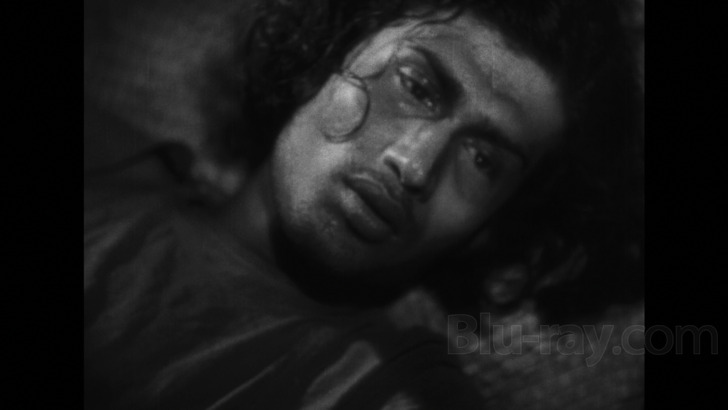
Criterion has packaged Two Girls on the Street and Kalpana together on one disc. After selecting an individual film, supplements exclusive to that film are then accessible, as follows:
- Martin Scorsese Introduction (HD; 2:37)
- On Kalpana (HD; 23:50) features interviews with filmmaker Kumar Shahani and Indian film historian Suresh Chabria. Some of the English is subtitled due to thick accents.
Kalpana Blu-ray Movie, Overall Score and Recommendation 
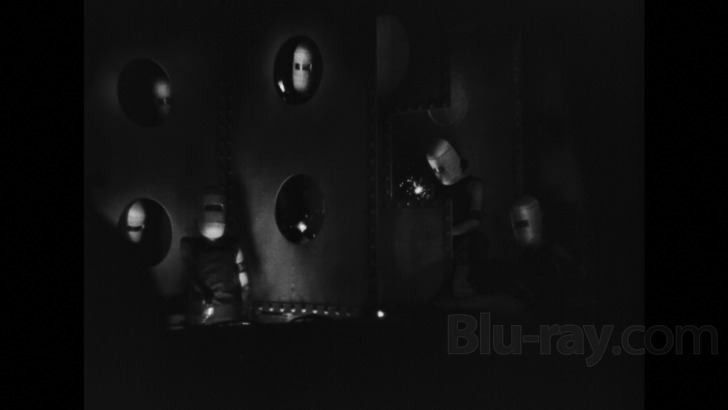
Kalpana is in some ways the most singularly astounding film in this fourth volume, and for that reason alone some of the technical limitations of both the video and audio presentations may arguably have to be accepted. I'm a huge Bollywood fan, and I had never seen Kalpana before, and it really caught me by surprise. With caveats duly noted, Recommended.
Similar titles
Similar titles you might also like
(Still not reliable for this title)

Prisioneros de la Tierra
Prisoners of the Earth
1939

Muna Moto
The Child of Another
1975

Sambizanga
1972

Chess of the Wind
شطرنج باد / Shatranj-e baad
1976

Two Girls on the Street
Két lány az utcán
1939

Dos Monjes
Two Monks
1934

After the Curfew
Lewat Djam Malam
1954

Downpour
رگبار / Ragbar
1972

Soleil Ô
Oh, Sun
1967

Taipei Story
青梅竹馬 / Qing mei zhu ma
1985

The Confrontation
Fényes szelek
1969

Lucía
1968

La Strada
1954

A River Called Titas
Titash Ekti Nadir Naam
1973

Redes
1936

Dry Summer
Susuz Yaz
1963

Touki Bouki
1973

Through a Glass Darkly
Såsom i en spegel
1961

Winter Light
Nattvardsgästerna
1963

The Passion of Anna
En passion
1969